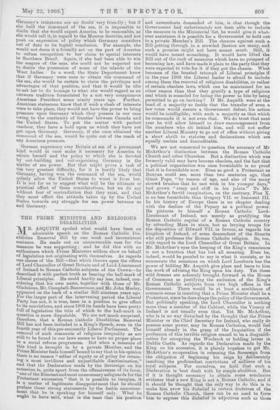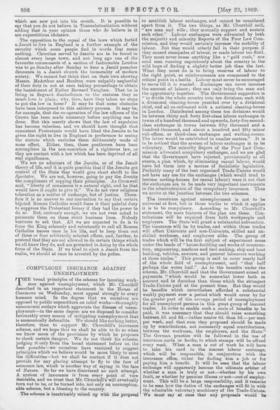THE PRIME MINISTER AND RELIGIOUS DISABILITIES.
MR. ASQUITH spoiled what would have been an admirable speech on the Roman Catholic Dis- abilities Removal Bill by one weak and inconsistent sentence. He made out an unanswerable case for the measure he was supporting ; and he did this with an enthusiasm which Prime Ministers seldom show on behalf of legislation not originating with themselves. As regards one clause of the Bill—that which throws open the offices of Lord Chancellor of Great Britain and of Lord-Lieutenant of Ireland to Roman Catholic subjects of the Crown—he described it with perfect truth as bearing the hall-mark of Liberal principles. He could hardly say less, indeed, con- sidering that his own name, together with those of Mr. Gladstone, Mr. Campbell-Bannerinau, and Mr. John Morley, appeared on the back of a similar Bill nineteen years ago. For the larger part of the intervening period the Liberal Party has not, it is true, been in a position to give effect to its convictions, and since 1906 its hands have been pretty full of legislation the title of which to the hall-mark in question is more disputable. We are not much surprised, therefore, that a Roman Catholic Disabilities Removal Bill has not been included in a King's Speech, even in the fourth year of this pre-eminently Liberal Parliament. The removal of such remnants of religious inequality as are still to be found in our laws seems to have no proper place m.a social reform programme. But when a measure of this kind is brought in by a private Member, and the Prime Minister feels himself bound to say that in his opinion there is no reason "either of equity or of policy for retain- ing a most invidious and unjustifiable discrimination," and that the Declaration made by the Sovereign on his !accession is, quite apart from the offensiveness of its form, "one of the flimsiest and most unnecessary safeguards for the protestant succession" that it is possible to imagine, it is a matter of legitimate disappointment that he should preface these strong statements by the feeble announce- ment that lie is speaking for himself only. What he ought to have said, what is the least that his position and antecedents demanded of him, is that, though the Government had unfortunately not been able to include the measure in the Ministerial list, he would give it what- ever assistance it is possible for a Government to hold out to a private Member's Bill. The chances against such a Bill getting through in a crowded Session are many, and such a promise might not have meant much. Still, it would have meant something. It would. have lifted the Bill out of the ruck of measures which have no prospect of becoming law, and have made it plain to the party that they were expected to vote for it if they got the chance. What becomes of the boasted triumph of Liberal principles if in the year 1909 the Liberal leader is afraid to include among them the removal of religious disabilities, or rather of certain obsolete laws, which can be maintained for no other reason than that they gratify a type of religious zeal which is consoled for losing the power to bite by being permitted to go on barking? If Mr. Asquith were at the head of a majority so feeble that the transfer of even a few votes would ensure a Government defeat, his action would be intelligible; with such a majority as that which he commands it is not even that.. We do trust that next year he will allow himself to draw encouragement from the numbers who sit behind him, and will not suffer another Liberal Ministry to go out of office without giving a short shrift to statutes and declarations which are equally useless and discreditable.
We are not concerned to question the accuracy of Mr McArthur's distinction between the Roman Catholic Church and other Churches. But a distinction which was formerly valid may have become obsolete, and the fact that a political organisation was once formidable is no proof. that it is formidable now. Even so good a Protestant as Bunyan could see, more than two centuries ago, that Giant Pope, "by reason of age, and also of the many shrewd brushes that he met with in his younger days," had grown "crazy and stiff in his joints.' To Mr. McArthur's fervid imagination, on the contrary, Pius X. is no less formidable than Gregory VII. or Innocent III. In his history of Europe there is no chapter dealing with the decline of the Papacy as a political power. He pictures to himself a Roman Catholic Lord- Lieutenant of Ireland, not merely as gratifying the Roman Catholic capital of a Roman Catholic country by attending Mass in state, but as levying troops for the deposition of Edward VII. in favour, as regards his kingdom of Ireland, of some descendant of the Stuarts who still professes the Roman Catholic religion. So, too, with regard to the Lord Chancellor of Great Britain. In Mr. McArthur's eyes the keeping of the King's conscience is not a function that has lost all meaning. Even he, indeed, would be puzzled to say in what it consists, or to enumerate the occasions on which Lord Loreburn has the power of bidding Mr. Asquith give place and leave to him the work of advising the King upon his duty. Yet these wild dreams are solemnly brought forward in the House of Commons as justifying the exclusion of the King's Roman Catholic subjects from two high offices in the Government. There would be at least a semblance of common-sense in insisting that a Prime Minister shall be a Protestant, since he does shape the policy of the Government. But politically speaking, the Lord Chancellor is nothing more than a member of the Cabinet, while the Viceroy of Ireland is not usually even that. Yet Mr. McArthur, who is in no way disturbed. by the thought that the Prime Minister or the Chief Secretary for Ireland, who really do possess some power, may be Roman Catholics, would feel himself already in the grasp of the Inquisition, if the profession of this terrible religion ceased to be a disqualifi- cation for occupying the Woolsack or holding levees in Dublin Castle. As regards the Declaration made by the King on his accession, it is plainly hopeless to got Mr. McArthur's co-operation in releasing the Sovereign from the obligation of beginning his reign by deliberately insulting the profoundest convictions of millions of his loyal subjects. For Ourselves, we hold that such a Declaration is best dealt with by simple abolition. But if it is 'thought necessary to obtain some conclusive evidence that a new King is not a Roman Catholic, and if it should be thought that the only way to , do this is to make him avow his disbelief in certain doctrines of the Roman Catholic Church, there can be no need to force him to express this disbelief in adjectives such as thoie 'which are now put into his mouth. It is possible to say that you do not believe in Transubstantiation without adding that in your opinion those who do believe in are superstitious idolaters.
The opposition to the repeal of the laws which forbid a Jesuit to live in England is a further example of the security which some people find in words that mean nothing. Churches served by Jesuits are to be found in almost every large town, and not long ago one of the favourite amusements of a section of fashionable London was to go Sunday after Sunday to hear a Jesuit preacher denounce in a Jesuit church the immorality of modern society. We cannot but think that on their own showing Messrs. McArthur and Boulton were culpably neglectful of their duty in not at once taking proceedings to obtain the banishment of Father Bernard Vaughan.. That he is living in flagrant disobedience to the statutes they so much love is Plain; why, then, have they taken no steps to put the law in force ? It may be that some obstacles have been interposed to this salutary process. It may be, for example, that the co-operation of the law officers of the Crown has been made necessary before anything can be done. But this merely shows that the law of expulsion has become valueless, and we should have thought that consistent Protestants would have liked the Jesuits to be given the right to live in England in preference to seeing the statute which excludes them deliberately made of none effect. Either, then, these gentlemen have been accomplices in the non-execution of a righteous law, or they are content with a law which has been deprived of all real significance. We are no admirers of the Jesuits, or of the Jesuit theory of life, and it is quite possible that if the Jesuits got control of the State they would give short shrift to the Spectator. We are not, however, going to pay the Jesuits the compliment of copying their principles. As Cromwell said, "liberty of conscience is a natural right, and he that would have it ought to give it." We do not view religious toleration as a matter of exchange, but of justice. There- fore it is no answer to our contention to say that certain bigoted Roman Catholics would deem it their painful duty to suppress the Protestant heresy if they had the power to do so. But, curiously enough, we are not oven asked to persecute them on these strict business lines. Nobody ventures to ask that. Ail we are expected to do is to force the King solemnly and reluctantly to call all Roman Catholics names once in his life, and to keep them out of three or four arbitrarily selected offices, and, further, to pretend that they are not allowed to do certain things which we all know they do, and are protected in doing by the whole force of the State. If we tried to eject a Jesuit from the realm, we should at once be arrested by the police.











































 Previous page
Previous page